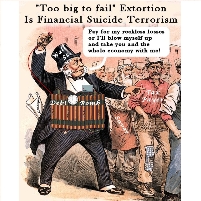Too Big to Fail: Dean Baker

In a recent article for the Boston Review, economist Dean Baker, co-director of the Center for Economic and Policy Research, reexamines the way the debate over deregulation has been defined. He writes, “In general, political debates over regulation have been wrongly cast as disputes over the extent of regulation, with conservatives assumed to prefer less regulation, while liberals prefer more. In fact conservatives do not necessarily desire less regulation, nor do liberals necessarily desire more. Conservatives support regulatory structures that cause income to flow upward, while liberals support regulatory structures that promote equality.” To prove this point, Baker compares patents, copyrights, and the “too-big-to-fail” doctrine, which all play a fundamental role in the market yet are not traditionally considered regulatory measures, and shows how these instruments of government policy funnel money to vested interests: “It does not matter that we call patents and copyrights “property” or even that we have a clause in the Constitution that authorizes Congress to grant patents and copyrights. Suppose autoworkers were given a property right to a job in the automobile industry, a right they could even sell. Would anyone say that this right to a job is part of the free market?... Investment bankers get incredibly rich because the government gives them the shelter of too-big-to-fail but doesn’t impose any serious prudential regulation in return.” Baker explains the financial meltdown and the subsequent grant of government-issued golden parachutes, writing, “The key regulation that remained in place was the “too-big-to-fail” doctrine. Essentially, the banks and other financial institutions took enormous risks with an implicit guarantee that their creditors could count on the protection of the U.S. government if things went badly.”
- Top Stories
- Unusual News
- Where is the Money Going?
- Controversies
- U.S. and the World
- Appointments and Resignations
- Latest News
- Trump Renames National Football League National Trump League
- Trump to Stop Deportations If…
- Trump Denounces World Series
- What If China Invaded the United States?
- Donald Trump Has a Mental Health Problem and It Has a Name






Comments